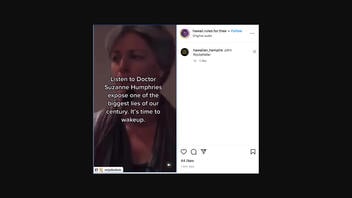Fact Check: Doctors ARE Taught About Vaccines In Medical School

Do medical schools neglect to teach future doctors about vaccines, how they’re made and their potential dangers? No, that’s not true: Vaccine education is a typical part of the training in schools of medicine. Representatives of multiple medical schools told Lead Stories that learning about vaccines is a foundational part of their curriculum for teaching students to become doctors.
The claim appeared in a video on Instagram on November 20, 2022. The video’s text teaser says:
Listen to Doctor Suzanne Humphries expose one of the biggest lies of our century. It’s time to wakeup.
This is what the video looked like on Instagram at the time of writing:
(Source: Instagram screenshot taken on Mon Nov 21 21:29:17 2022 UTC)
The doctor
Humphries, who practices internal medicine in Maine and specializes in nephrology, said this in the video:
You may not know this, but doctors are not taught about vaccines in medical school. We are not taught what’s in vaccines … we are not taught how vaccines are manufactured, as far as what kind of animals go into them. We are not taught the potential dangers of vaccination and we are basically given a piece of paper that says when the vaccines are due and to give them.
The medical schools
Dr. Geoffrey Talmon, associate dean of medical education at the University of Nebraska Medical Center, said that’s not the case. In a November 21, 2022, email, he told Lead Stories:
Students receive at least 6 hours of training on this critical disease prevention measure spread across all four years and in each of the three phases of our curriculum. This includes dedicated instruction and in each of the following topics:
- Methods of production different forms of vaccines and their respective mechanisms of action
- Data on vaccine efficacy and how to calculate/utilize this information in counseling patients
- Differences in effectiveness/guidelines among different patient populations
- The clinical presentations of illnesses that would be prevented by commonly utilized vaccines
- Vaccine hesitancy and methods for addressing it
Talmon continued in a second email on the same date:
For context, this usually represents a substantial amount for a given topic. For example, it is the same amount of time we devote to the basics of cancer.
The three phases of the curriculum are the Foundations of Medicine Phase (preclinical course work), Clinical Applications Phase (required clinical experiences), Career Exploration Phase (electives and required advanced didactic teaching).
Harvard Medical School has similar requirements. In a November 21, 2022, email to Lead Stories, the Harvard Medical School Office of Communications and External Relations provided this statement:
Educating future physicians about the fundamentals of immunity, infectious disease pathophysiology, prevention and treatment is absolutely central to any medical school curriculum, and this education, by definition, includes vaccines.
<!–
The review
5c07c007f87cd38b2a45ecf45bf685de 68ac296169f45d9a3f33a205c17b246e e1cf11e5a2058bfc7dd70dac1618846a
c81adeebf3c4c9e2a8d9e54b2b3a0f15
–>
Additional Lead Stories fact checks related to COVID-19 vaccines can be found here.



